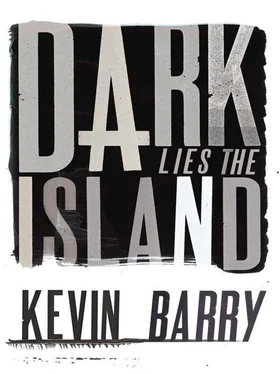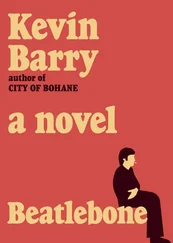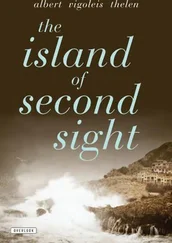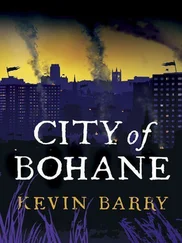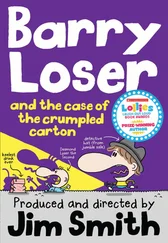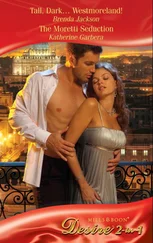Kevin Barry - Dark Lies the Island
Здесь есть возможность читать онлайн «Kevin Barry - Dark Lies the Island» весь текст электронной книги совершенно бесплатно (целиком полную версию без сокращений). В некоторых случаях можно слушать аудио, скачать через торрент в формате fb2 и присутствует краткое содержание. Год выпуска: 2012, Издательство: Jonathan Cape, Жанр: Современная проза, на английском языке. Описание произведения, (предисловие) а так же отзывы посетителей доступны на портале библиотеки ЛибКат.
- Название:Dark Lies the Island
- Автор:
- Издательство:Jonathan Cape
- Жанр:
- Год:2012
- ISBN:нет данных
- Рейтинг книги:3 / 5. Голосов: 1
-
Избранное:Добавить в избранное
- Отзывы:
-
Ваша оценка:
- 60
- 1
- 2
- 3
- 4
- 5
Dark Lies the Island: краткое содержание, описание и аннотация
Предлагаем к чтению аннотацию, описание, краткое содержание или предисловие (зависит от того, что написал сам автор книги «Dark Lies the Island»). Если вы не нашли необходимую информацию о книге — напишите в комментариях, мы постараемся отыскать её.
Dark Lies the Island
Dark Lies the Island — читать онлайн бесплатно полную книгу (весь текст) целиком
Ниже представлен текст книги, разбитый по страницам. Система сохранения места последней прочитанной страницы, позволяет с удобством читать онлайн бесплатно книгу «Dark Lies the Island», без необходимости каждый раз заново искать на чём Вы остановились. Поставьте закладку, и сможете в любой момент перейти на страницу, на которой закончили чтение.
Интервал:
Закладка:
iv
Wedding was a raw expanse of towerblocks, tattoo pits, kebab shops. Nogoodniks in mauve-coloured tracksuits decorated every corner. We had a properly respectful air as we passed through. This was how Berlin was supposed to be. We cut down a back way, for a while, to avoid the main drag, because the sight of the kebab gyros was sickening Silvija’s stomach, which was troublesome. The rearsides of the towerblocks loomed either side of a dirt pathway itchy with catkins beneath our sandals, and the word ‘proletariat’ rolled its glamorous syllables over my tongue. Silvija may have been lazy as a feline in her stride but she made as sly and sure-footed a progress. She wore black military fatigues cut off at the knee and a black vest a couple of sizes too small the better to ride sexily high on her waist. Just as we approached the tenement where the shoot would take place, Silvija received a call to say the Tasmanian had ‘technically died’ that morning but the show would go on.
There were always such complications. The Tasmanian’s assistant, a serene Vietnamese, was instead in charge when we reached the old apartment where the shoot would happen. Politely, we asked after the designer.
‘At six a.m.?’ the Vietnamese grinned. ‘Clinical death! Now? Much improve!’
The room was peopled with hipster flunkies, and the Turkish model was in place. She had a pair of recent stab wounds in her side and looked as if she had walked straight off a human rights-type poster about torture. Silvija began to set up — she would not go digital and used commie-era Leicas always. I attempted to calm the model who was mouthing vengeance of death against a two-timing girlfriend. The anal beads and the Rottweiler were introduced. Silvija declared that the dog lacked a sufficiently vicious mien and she smashed a camera lens off the wall. She attempted to goad the dog to promote a viciousness but there was no response, and the shoot, as so often, broke down into a period of tense analysis. Pils was sent for to help smooth the debate. It went not well, even so, with Silvija questioning the talents of the absent Tasmanian.
‘Motherfucker calls himself a designer,’ she said. ‘And his autumn fucking accessory? Anal fucking beads! Once again with the anal fucking beads!’
In my innocence, I did not know the exact purpose of anal beads, and I confided as much to the Turkish model.
‘Is sex toy,’ she said. ‘Lots and lots of glitter beads on a chain. These beads they get bigger in sequence. What you do with these beads …’
I put a hand to my empty stomach, and pleaded.
Silvija opened the scarred laptop and mailed the Tasmanian — he was apparently online even in intensive care — and sprayed some heavy snark about his autumn accessories. The Vietnamese clucked contentedly and went to the kitchen zone and stirfried some scallions and chicken gizzards. The flunkies lounged in hipster bliss, and then fizzed madly and loudly for a few moments — looking for knickers or garter belts — and then lounged some more. The Turkish model stroked the inside of my arm and said she was not exclusively homo and had always liked redheads. I was on a roll with ladies who liked ladies. Eventually some photos were taken. The Rottweiler took a dump in the middle of the floor. Silvija said:
‘Perfect! We use the shit!’
This was the Berlin fashion scene, in the summer of 2005, in the district of Wedding. There was a lot of heroin and a lot of dog shit. Everybody was thin and gorgeous.
And Jesus, did we smoke.
v
I was finding out how carelessly life might be lived. The people I met through Silvija were all addictions and stylish madness. Every other hour, there was a crack-up, or an arrest, or an abortion, or somebody jumped out a window, or fucked an Austrian heiress, and every deranged turn of events was so gladly met and swirled with. They were attuned to the wild moment, while I was yet nervous, careful, locked to the past. It seemed to me that they had all grown up godless and without foul repressions. They had not grown up sitting on three-piece suites of floral design in the beige suburbs. They had not come to adulthood in rooms laid with unpleasantly diamond-patterned carpets bought off the travellers at the markets of drab Irish towns. How can I begin to explain? Does it suffice to say that the olive oil in my childhood home was kept in the bathroom? It was bought at the chemist shop and drizzled mournfully onto my father’s problem scalp. Hair was never good for our people, generally, perhaps on account of the remorseless wind that assaults the sides of west Limerick mountains. It is no exaggeration to say that the male forebears of my clan — my father and his brothers — were scarred by wind. They all had the permanently startled look that comes from working outside in hard gusts, and something of it had been passed onto me, this look; even though I had never myself stood in the teeth of a force six gale wrestling a stuck cow from the boggy sump of a ditch; even though I spent my time writing lurid short stories and (increasingly perceptive and subtle) essays about the emergence of Italian Neo-Realism in the 40s, and the troubled legacy of the Nouvelle Vague.
Silvija, of course, was fanatically well read. She read everything and in six languages. She had informed me quietly that I was a genius. She told me that I was the culmination of Irish literature. (She said it ‘litra-chure’.) It had all been leading up to me.
She had such faith.
vi
The shoot broke down into the usual chaos. There were taunts and ultimatums. Silvija and I walked. We decided to go instead and rob some Americans. There was a roost of them in our building. They were on the floor directly beneath the studio. We could hear the insect trilling of their talk down there.
‘When the Americans appear,’ Silvija said, ‘it means that Berlin is officially over. May it rest in peace. Amen.’
Daily, the gauche and Conversed hordes priced out of San Francisco and Brooklyn were arriving, with their positivity, their excellent teeth and their MFAs. They could be spotted a mile off in the clubs — their clothes were wrong, their hair was appalling and their dancing was just terrible.
We rang the bell on their apartment. We listened. It was empty — they must have been out photographing the TV tower or taking rides in the tourist-rental Trabants. We went upstairs to our studio and shinned down from the studio balcony to theirs. We quickly made through the place. We found eight hundred dollars in the drawer of a vanity and two passports — Becky Cobb and Corey Mutz, in chunky retro eyewear both — and we took these also. There was a price to be had for American passports from the Ukrainians who drank at Dieter’s. We left the way we had come — Silvija climbed like a jungle cat; I laboured. But we made it, and we went and had us a royal day on the town.
In a vast Old German-type trough, we stuffed ourselves with many potato-based dishes and many enormous sausages. We drank exquisite Burgundy and Bavarian whisky. And pils. We touched each other beneath the tablecloth. What Silvija could do with her toes was extraordinary. She taught me, phonetically, the choruses of some enchanting childhood songs of the steppe.
‘But what are these songs about?’ I asked.
‘Mostly they are about oxen and death,’ she said.
We left the restaurant and went to Dieter’s. It was a low bar on Schönhauser Allee, and there we had more pils and a rendezvous with the scarred and mysterious Hoods of Kiev. These were among the characters lately populating my stories but I could get them only palely. There was no way to render with a still-callow pen the force of intrigue stored in the black heat of Victor’s eyes, nor the sexual languidity in the way that Xcess (as she styled herself) drained her glass, nor the … I just couldn’t get it down right. We made another two hundred euro from the passports. We left the bar and walked down the street — the plan was to buy some new and impractical shoes. There was the rumble above us of the elevated trains. I complained at the lack of true lustre in my stories. Silvija sighed and stopped up on the pavement and she took hold of my elbow. She gave me one of her statements or manifestos, then, one of her great orations on the Nature of Art:
Читать дальшеИнтервал:
Закладка:
Похожие книги на «Dark Lies the Island»
Представляем Вашему вниманию похожие книги на «Dark Lies the Island» списком для выбора. Мы отобрали схожую по названию и смыслу литературу в надежде предоставить читателям больше вариантов отыскать новые, интересные, ещё непрочитанные произведения.
Обсуждение, отзывы о книге «Dark Lies the Island» и просто собственные мнения читателей. Оставьте ваши комментарии, напишите, что Вы думаете о произведении, его смысле или главных героях. Укажите что конкретно понравилось, а что нет, и почему Вы так считаете.
